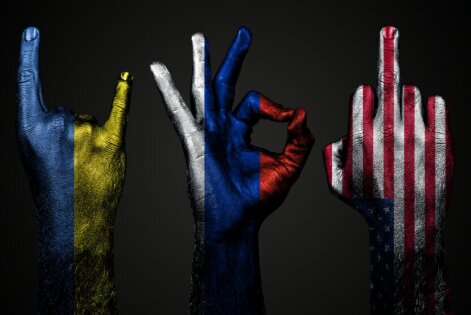After the latest talks between Vladimir Putin and Joseph Biden, it has finally become clear that neither the United States nor NATO will take part in the military conflict in defense of Ukraine. Vladimir Putin has once again proved the effectiveness of the demonstration of military force, posing a threat to the West, which, due to the weakness of Western leaders, is unable to effectively contain imperialist Russia.
Biden's willingness to negotiate was seen by Russian security forces as the inability of the United States, NATO and the EU to fiercely oppose Russia. Russian security officials are convinced that even after a full-scale military aggression against Ukraine, the West will not dare to impose hellish anti-Russian sanctions. Russian officials believe that in order to de-escalate and prevent a humanitarian crisis in the EU, Western leaders, who are reluctant to oppose the Chekist corporations during Russia's invasion of Ukraine, will persuade the Ukrainian authorities to agree to sign a "peace treaty" unfavorable to our country. Unfortunately, Joseph Biden played a Kremlin game, proving the effectiveness of Putin's geopolitical blackmail aimed at demoralizing Ukrainians and provoking a split in NATO and the EU.
So far, leading American experts have not answered the question, what is the ultimate goal of Russia's hybrid war? Some politicians in the United States believe that Vladimir Putin wants to be recognized as the leader of a superpower, so a constructive agreement on European security is needed to prolong the Biden administration. Through discussions with the Kremlin, US peacekeepers say the United States could persuade Russia to relinquish destabilizing steps, whether political or military, and begin discussions on arms control.
U.S. experts working with Jack Sullivan, the US president's national security adviser, are even proposing to discuss with the Kremlin on a European military agreement, so they say European countries and Ukraine should send delegates to take part in the negotiations.
For many influential American experts, our country is a peripheral one, and Ukraine's accession to NATO, according to American pro-Kremlin "peacekeepers," will contribute to the danger of the North Atlantic Alliance. According to them, Ukraine's accession to NATO destabilizes the entire Alliance, so the Biden administration, instead of pushing Russia to China, should instead reconsider NATO's open door policy, which will seemingly end the crisis between Moscow and the West through diplomacy that will promote a stronger world.
In fact, the Chekist corporations, using the massive corruption of Western politicians and experts, have managed to create quite influential groups of influence in the West, and, unfortunately, in the United States and Europe there are still many intellectuals who are useful idiots. All of the Kremlin's non-enlargement initiatives and the new European security system are aimed primarily at widening the split between new and old Europe, which will increase mistrust between the allies.
As for Ukraine, it is sometimes striking that Western politicians and experts do not understand the importance of our country for the security of the West. The Kremlin's ideologues, unlike many Western analysts, are well aware that Ukraine's takeover will allow Chekist corporations to turn our country into a springboard for destroying the sanitary border and geopolitically defeating Poland, Romania, Lithuania, Latvia and Estonia. After the elimination of the sanitary border, nothing will stop the Kremlin from creating a geopolitical axis Moscow-Berlin-Paris, which will result in the expulsion of the United States from Europe, which is the ultimate goal of the hybrid war waged by Russia.
According to the First Minister of Foreign Affairs of the Russian Federation Andrei Kozyrev, the decision on geopolitical confrontation with the collective West was made by the Russian elite in 1995, not without reason in his texts Kremlin ideologue Vladislav Surkov hints that democratic processes in Russia was a complete fake to mislead the Western political elite. Even the well-known Russian oligarch Oleg Deripaska has repeatedly said that by imitating democratic processes, the Kremlin has managed to strengthen economic interdependence between Russia and the West, resulting in increased influence of the Chekist corporation on the Western elite.
It is also very advantageous for the Kremlin to distract China from the United States, because the greatest fear of Russia's political elite, according to Putin's ideologues, is an agreement to end the geopolitical confrontation between America and China. In the event of such an agreement, Russia would, in fact, be left alone, both with the West and with China, so the Kremlin is interested in the American-Chinese confrontation lasting.
Unlike Russia, China, according to Chinese military experts, is not ready for a military conflict with the West, because most Chinese people live in megacities on the coast, and China is known to be highly dependent on maritime trade, which accounts for 60% of its foreign trade. The level of combat capability of the People's Liberation Army of China is very difficult to assess, because the Chinese military has no combat experience. China is also heavily dependent on coal imports, which could be blocked by the United States and its allies in the event of a military conflict. It should be understood that China has a critical dependence on coal energy, which accounts for more than 70% of all resources consumed in China's energy balance.
It is noteworthy that Chinese experts acknowledge that the Chinese Armed Forces are not capable of full-scale operations at a great distance from China due to problems related to logistics. So the question may occur, why did the United States start a geopolitical confrontation with China, pushing it to rearm and militarize? When the Chinese regime now has the opportunity to attribute all its mistakes to the geopolitical conflict with America.
Some American analysts believe that the decision to confront China was made in the United States under pressure from American private corporations, which were afraid of competition from Chinese state-owned corporations. One cannot ignore the point of view of the famous American sociologist Richard Lachman, who is convinced that the weakening of the state and the decline of trade unions in the United States are primarily due to increasing influence of private corporations on government and American politicians. The consequence of these processes in the United States was the separation of the elite from society and its polarization, which reduces the geopolitical influence of America.
The United States is no longer a "magnet" for other countries because the American elite, beginning with the Obama administration, has pursued a nationalist foreign policy that ignores the interests of its allies and partners. It is unfortunate that the United States does not understand how important Ukraine is for the security of the West. Ukraine is, in fact, the "key" to Russia's democratization, and the Kremlin is well aware of this, unlike the short-sighted Western leaders who use our country to trade with Moscow.
We must not forget that Germany, which received large-scale economic aid from the United States, was the first frontier of the West. Then the German elite decided to move the frontier to Poland, from which the state was created - a showcase for Eastern Europe and the post-Soviet space. Later, the Polish elite decided that the frontier should be moved to Ukraine, but our country, unlike Germany and Poland, did not receive large-scale economic and security assistance from the West, without which it is impossible to move the frontier to Russia.
The West is saved only by the fact that by their actions and decisions the Russian elite has discredited everything connected with Russia in Ukraine. Vladislav Surkov, who persuaded Vladimir Putin to launch a military aggression in the Donbas, especially facilitated this process. So when Russian authorities ask a rhetorical question about why Russia lost Ukraine, they should mention the main directors of "Russian Spring" Vladislav Surkov, Konstantin Zatulin and Sergei Glazyev, who imposed on the Kremlin the ideology of the "Russian world", which was defeated in Ukraine.
The Kremlin has made a big mistake by violating one of the main rules of cognitive war, because when identity is threatened, people are much tougher in defending their views and do not accept ideas that are imposed by force. When identity is not threatened, people are calmer about new ideas. The Russian government, without realizing it, left no choice to the Ukrainians, because if Russia stops fighting, the war will end, but if Ukraine stops fighting, it will lose its independence.

























